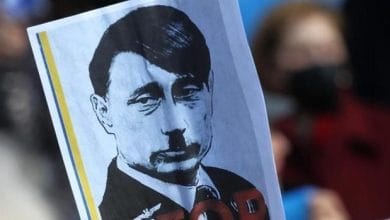
Graham Allison: Kyiv must seize this moment. Otherwise, stalemate might be inevitable.
Graham Allison is the Douglas Dillon professor of government at Harvard University.
The extraordinary coup attempt by a Russian mercenary leader provides Ukraine with an unexpected opportunity to press whatever advantages it has in its war with Moscow. If it does not seize this chance and break the stasis that governs the battlefield in eastern Ukraine, we will enter a very different chapter in this conflict.
When President Vladimir Putin invaded Ukraine in February 2022, Russian troops captured more than 1,000 square miles of Ukrainian territory per week. This was followed by a second phase of the war, in which Ukraine’s counteroffensive pushed Russian forces back, recovering hundreds of square miles weekly.
But then last November, the war entered a third phase: For the past eight months, though the casualty rate on both sides remains high, neither army has managed to gain 100 square miles of territory in a single week.
By this yardstick — and as we enter the fourth week of Ukraine’s counteroffensive — the inescapable fact is that the prognosis is more of the same. So far, Ukrainian attackers have been able to take back fewer than 50 square miles each week. On both sides of the divide, each dug trenches, planted mines and built defenses making it difficult for the other to mobilize the 3-to-1 advantage offensive forces usually need to force a breakthrough.
To put the matter in perspective: Today, Russia controls about 17 percent of the territory that was previously Ukraine’s. If Ukrainian forces are no more successful in the weeks ahead than they have been so far, Ukraine will not recapture all of its territory for 16 years.
As Defense Secretary Lloyd Austin has acknowledged, Americans who have been arming and training Ukrainian forces for this campaign were hoping to see an “overwhelming success.” Why Ukraine has not been more effective remains uncertain. Nor has anyone yet explained why Ukraine waited so long to launch its attack.
History reminds us that wars hinge on many contingent factors. Their outcomes are no more predetermined than the results of the NBA championship or the World Cup. If the failed insurrection makes Russian soldiers manning the front lines less willing to risk their lives, Yevgeniy Prigozhin’s mutiny could be the proverbial straw that broke the camel’s back.
On the other hand, if Ukrainian forces remain bogged down over the course of the summer, we should expect the political dimension of this war to determine events. Many of Ukraine’s supporters in Europe and even in the United States will join the global south’s chorus calling for both sides to stop the killing and begin serious negotiations about a cease-fire.
If they reach an agreement, or even a de facto cease-fire, expect all parties to declare “victory” for what they have achieved at this point — and do their best to sell that story to their key constituents. Should this happen, the world will celebrate the end of fighting and call that “peace.”
Any resemblance between this possibility and what happened in the conflict between Russia and Ukraine from 2016 to 2022 is not coincidental. For those who need a reminder: In 2014, Putin seized Crimea and invaded Donbas. The following year saw intense fighting that then sharply declined as both sides found themselves unable to advance.
In the six years that followed, through a succession of cease-fires and negotiations, troops faced off along a line of control in what the Defense Department called “low intensity conflict.” In that period, fewer combatants were killed each week than the number of Americans who were murdered by fellow citizens in the city of Chicago.
Another long pause would not mean the end of the war. Whatever negotiations occur or agreements are reached about selective issues, such as prisoner exchanges, Putin will not give up his ambition to own Ukraine, and Ukrainians will never give up their claim to recover all of their territory. Nonetheless, if there should be another multiyear pause, Ukraine and Russia — whoever is in charge — will have the opportunity to rebuild their own societies and military capabilities for their uncertain futures.
Zelensky and his Ukrainian colleagues’ courage and resilience in defeating Russia’s attempt to erase their country from the map has defied all expectations. If they can be as successful in rebuilding their country, Ukraine could yet emerge as the West Germany or South Korea of the 21st century.
